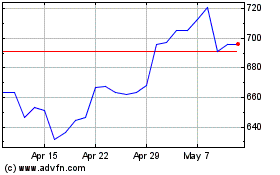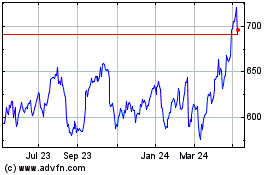HSBC Profit Slumps on Coronavirus, Trade Tensions -- 2nd Update
August 03 2020 - 8:13AM
Dow Jones News
By Simon Clark
LONDON -- HSBC Holdings PLC's net profit plummeted in the second
quarter as the impact of the coronavirus pandemic complicated the
bank's efforts to refocus on Asia while dealing with rising
U.S.-China political tensions.
Profit for the global bank with Asian roots fell 96% to $192
million in the three months ended June. The London-based lender set
aside $3.83 billion in provisions for losses from loans during the
quarter, almost seven times more than in the same period last year.
Almost 40% of the new provisions were for the bank's unprofitable
U.K. unit. HSBC set aside $3 billion in the first quarter. HSBC set
aside $3 billion in the first quarter.
"Current tensions between China and the U.S. inevitably create
challenging situations for an organization with HSBC's footprint,"
Chief Executive Noel Quinn said in a statement.
Mr. Quinn said he would accelerate plans announced in February
to streamline the bank's operations by shedding 15% of its
235,000-strong workforce and cutting business lines and customer
relationships across the U.S. and Europe to refocus on its more
profitable Asian heartland. HSBC was founded in Hong Kong and
Shanghai in the 1860s and makes most of its profit in Hong Kong and
mainland China.
HSBC's U.S. unit is taking a major hit in the pullback. The bank
said Monday that its U.S. unit is on track to slash risk-weighted
assets in its global markets unit by $5 billion, or about 45%, and
to consolidate some fixed income activities in London by the end of
2020. The bank closed 80 U.S. branches this year as part of its
restructuring plan.
HSBC joined other British lenders earlier this year in canceling
dividend payouts at the request of the Bank of England, a move
aimed at shoring up their capital buffers against economic shocks
stemming from the pandemic. This hit the bank's mom-and-pop
investor base in Hong Kong hard, and its shares are down about 45%
this year. The stock dropped as much as 7% Monday.
The bank will set aside as much as $13 billion for bad loans in
2020 as the economic outlook remains uncertain, particularly in the
U.K. HSBC's U.K. unit swung to a pretax loss of $857 million in the
second quarter, as it became the latest lender to report weak
results at its operations in the U.K., which has recorded more
deaths from coronavirus than any other European country. The U.K.
also faces uncertainty as it still has to strike an agreement with
the European Union on a future trade relationship.
"The U.K. economy is facing two things both at the same time,"
HSBC Chief Financial Officer Ewen Stevenson said in an interview.
"Relative to some of the Asian economies Covid is having a more
dramatic economic impact here, and it's also facing the prospect of
Brexit."
The bank's rebalancing toward China has become more complicated
because of rising political tensions. In June, U.S. and British
politicians strongly criticized HSBC after its Asia chief publicly
signed a petition backing a security law Beijing was imposing on
Hong Kong. U.S. Secretary of State Mike Pompeo called HSBC's
support for the law a "show of fealty" that "seems to have earned
HSBC little respect in Beijing."
After supporting the law, HSBC drew strong criticism in the
world's most populous nation for its involvement in a U.S. legal
case against China's Huawei Technologies Co.
Chinese newspaper People's Daily wrote on July 24 that HSBC set
"traps" for Huawei to break U.S. sanctions against doing business
in Iran. HSBC said the U.S. Department of Justice made formal
requests for information about Huawei, a former HSBC client. HSBC
said it wasn't involved in the DOJ's decision to investigate Huawei
or to arrest Huawei finance chief Meng Wanzhou. Ms. Meng and Huawei
deny any wrongdoing.
"HSBC does not have any hostility towards Huawei and did not
'frame' Huawei," the bank said in a July 25 statement.
As HSBC strains to maintain good relations with both Washington
and Beijing, executives have become increasingly exasperated by the
rising political tensions. Sherard Cowper-Coles, HSBC's head of
public affairs and a former British ambassador to Afghanistan, in
June described the tension between the U.S. and China as "an
ideological war reminiscent on the American side of the depths of
McCarthyism."
Write to Simon Clark at simon.clark@wsj.com
(END) Dow Jones Newswires
August 03, 2020 07:58 ET (11:58 GMT)
Copyright (c) 2020 Dow Jones & Company, Inc.
Hsbc (LSE:HSBA)
Historical Stock Chart
From Mar 2024 to Apr 2024

Hsbc (LSE:HSBA)
Historical Stock Chart
From Apr 2023 to Apr 2024
